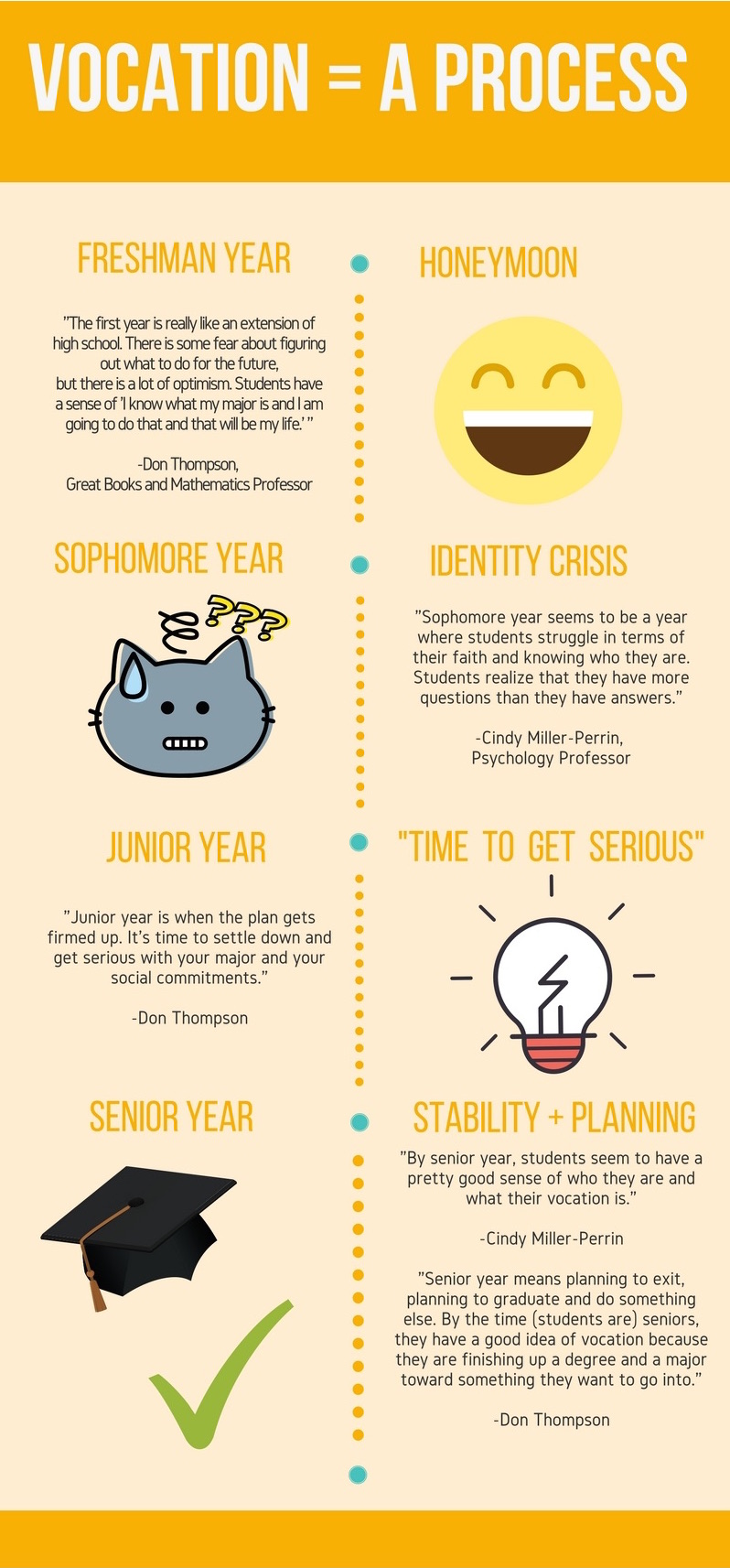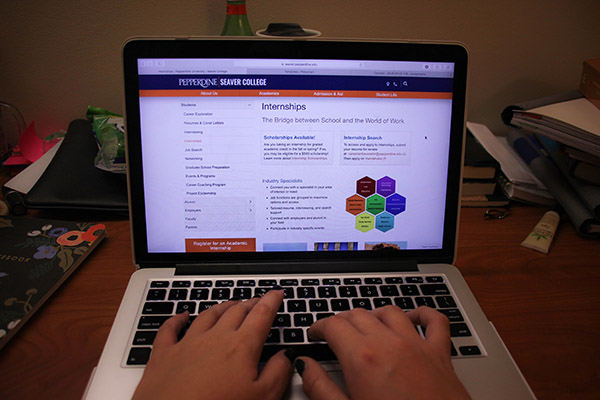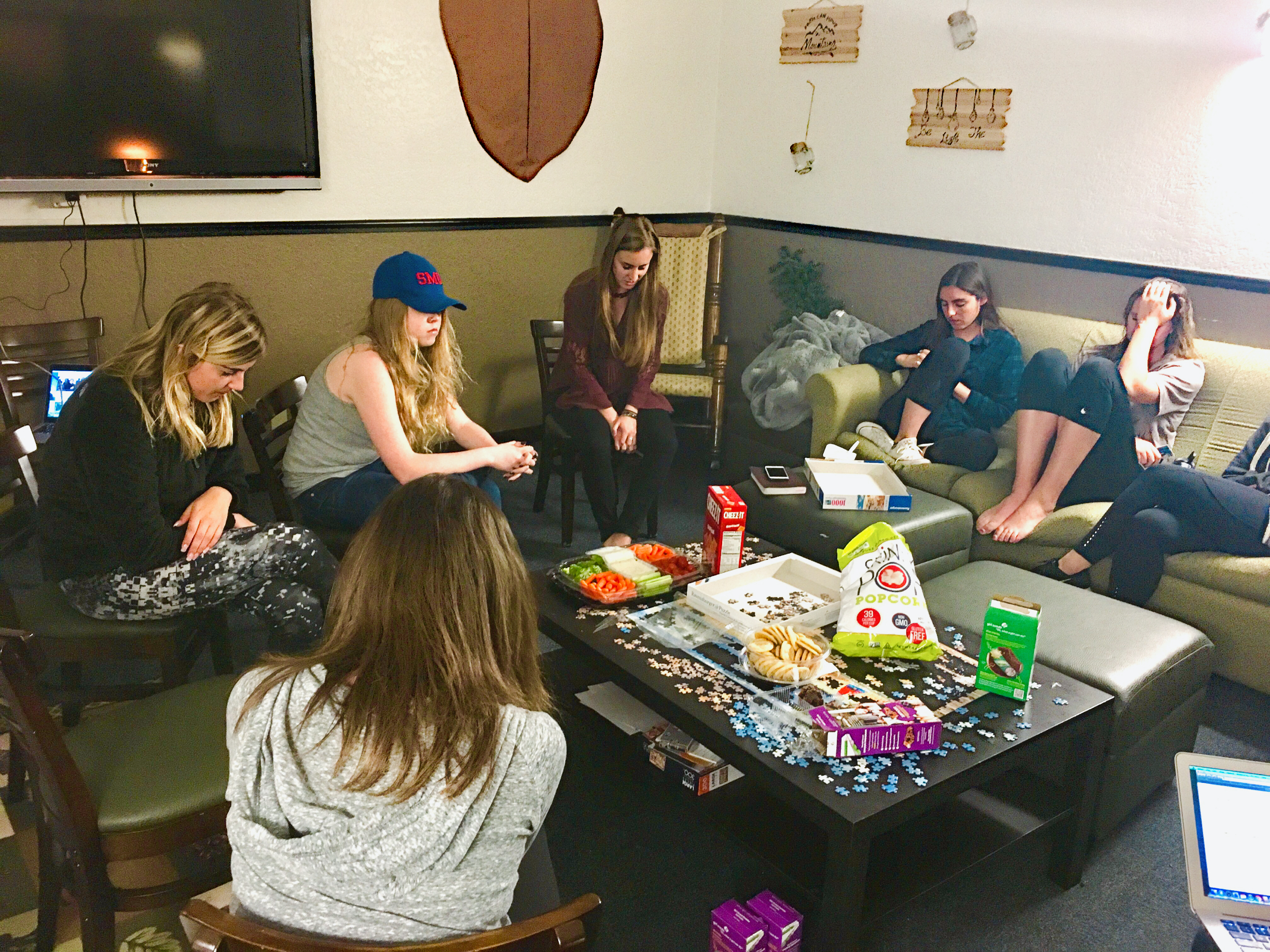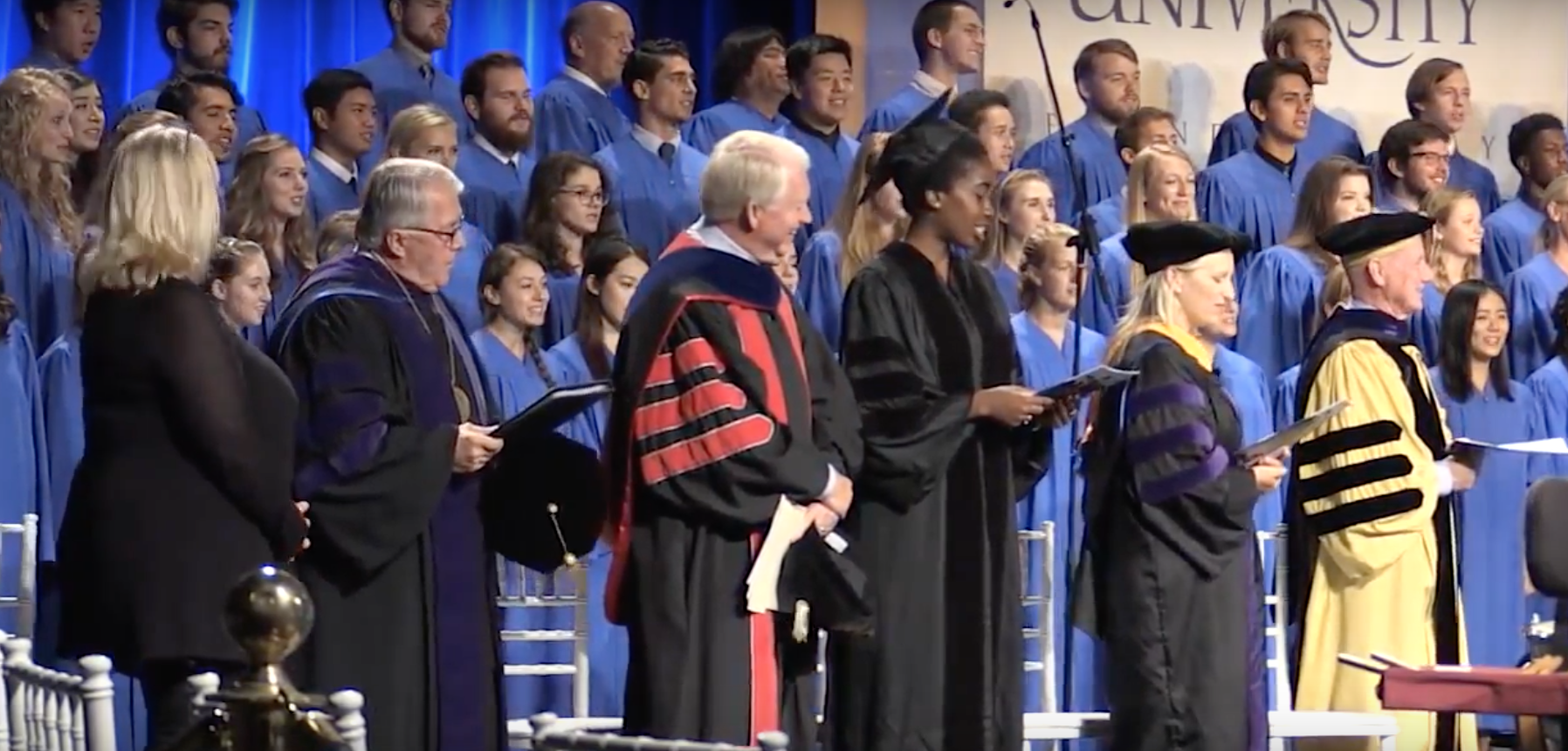
Vocation. It’s a concept Pepperdine students are pushed to explore before they step foot onto campus, but an internal realization students will spend the rest of their lives figuring out.
The prospect of determining one’s calling is undeniably a complex task. However, the fact that Pepperdine students even think about vocation is a testament to the university’s unique and successful mission in spreading the idea of having a higher purpose — a purpose that goes beyond what one does for a living.
“Vocation really encompasses all that you do in life,” said Stephanie Cupp, program coordinator for the Center for Faith and Learning. “A lot of it is looking at what brings you joy in the world. You recognize there’s a need and in fulfilling that need, you get great joy.”
Pepperdine began its large-scale discussion on vocation 15 years ago. Today, through ongoing faculty encouragement, a vocational ministry minor and an incoming student reading assignment, Pepperdine has made vocation a prominent topic to empower students to seek lives of fulfillment.
What exactly is vocation?
“A vocation is something that draws who you are out into the world,” Cupp said. “That can be in your job, at home, in the volunteer work that you do, at church or even how you interact with people in the grocery store.”
Cupp said it is important to understand that vocation encompasses much more than a career.
“You might be able to live out your vocation in their career, but that is not always the case,”
Cupp said. “For example, let’s say someone is a trash collector whose vocation is to serve people. They feel like they’re doing (their vocation) in that job, but what they really enjoy doing is going to work at a soup kitchen on the weekend. That’s where they get to interact with people in ways they can’t in their job. It’s where they feel fulfilled and can outpour service. That’s vocation.”
Great Books Professor Paul Contino, who also serves as the associate director of the Center for Faith and Learning, said vocation is also understanding how God calls each individual to serve the world.
“Every Christian believer has a calling to love God and to love neighbor,” Contino said. “That’s the general vocation of all of us, but we act on that in different ways and in different occupations. Vocation is then (a) calling in which we discern from God that directs us toward the way in which we use our gifts and talents in service of others.”
The history of vocation at Pepperdine
Pepperdine began discussing the topic of vocation in 2002 when the university received a $2 million grant from the Lilly Endowment, a private philanthropic foundation.
“The Lilly Endowment is very interested in seeing Christian education flourish,” Cupp said. “They created an initiative called Programs for the Theological Exploration of Vocation that Pepperdine joined and created a lot of things out of.”
Cupp said the grant started the Spiritual Life Advisor (SLA) program and funds the annual retreats in which new tenure-track faculty members spend a week overseas exploring what it means to teach at a Christian university and understanding how their own vocational journeys can inspire students.
Don Thompson, a Great Books and mathematics professor, said the grant’s role in bringing the topic of vocation to Pepperdine has completely transformed the university.
“Twenty years ago, conversations about career would involve what a student’s major and skills are,” Thompson said. “It’s now about your life, your soul, your personality. It’s about being aware that maybe you’re here not to just make money and go to work everyday. Virtually everyone who comes here knows about vocation and life purpose. That’s essential in helping students look beyond careers and jobs.”
After receiving the grant, the Center for Faith and Learning began a summer reading assignment to introduce incoming students to the idea of vocation.
The assignment includes reading former Pepperdine Communication Professor Gary Selby’s essay, “Finding Your Heart’s True Calling,” and writing a reflection on what students feel called to as they enter college. Selby is the immediate past director of the Center for Faith and Learning.
Analyzing the vocation initiative
Psychology Professor Cindy Miller-Perrin works with Thompson to gather information about students’ attitudes and behaviors related to faith, career, identity and spirituality.
The pair send out a survey every spring to the entire Seaver student body to assess how students change and develop in those categories.
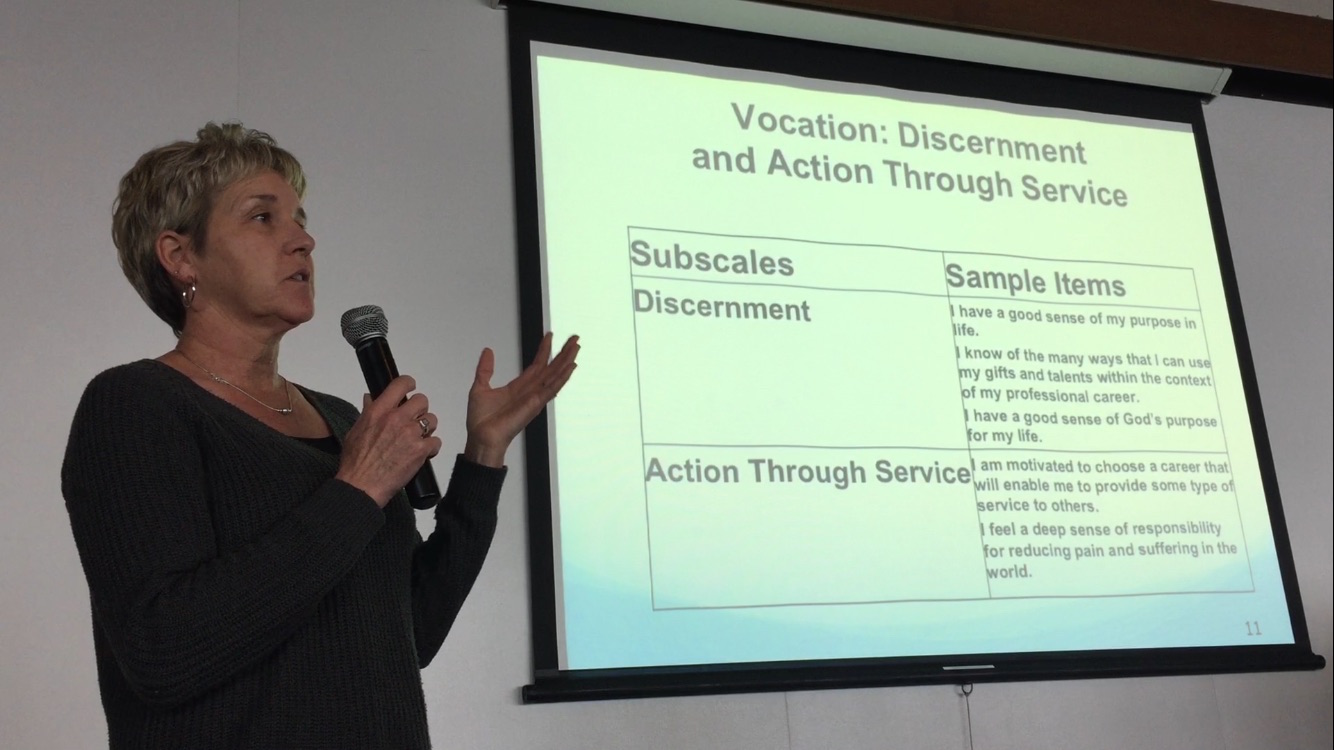
Psychology Professor Cindy Miller-Perrin discussed the results of this year’s student survey in the Fireside Room on March 21 (Photo by Kayiu Wong).
Thompson said they have found that freshman come into college with ideas on what they want to do in the future that are very much influenced by their parents. However, this changes radically over time due to new experiences and personal reflection.
Miller-Perrin said Pepperdine’s International Programs fuel students’ commitment to service and experiences abroad help students become more confident in their identity and calling.
“The biggest result of our research is that we are doing a lot of things right in terms of vocation,” Miller-Perrin said. “Students feel comfortable talking about and exploring vocation. Students are not going to be able to figure out what God is calling them to do in four years, but Pepperdine is giving them a start.”
Faculty perspectives on vocation
Religion Professor David Lemley said three ways students can further explore their vocation is noticing personal experiences of joy in certain types of work or service, listening to the people they are close to and investing in opportunities to experiment with different interests.
Lemley is also heavily involved in the vocational ministry minor Pepperdine offers.
“The minor helps students think more theologically about how their faith shapes the way they approach their work and what it means to be in a certain occupation or business as a Christian,” Lemley said. “It’s minor any student can add to their degree to hopefully give them some perspective and tools to discern what they are being called to do and how they are being called to do it.”
However, because college is prioritized as the means of obtaining a career, it may be hard for students to reflect on their calling when more immediate concerns are over occupational goals.
Amy Adams, Career Center executive director, said it is not practical for students to believe that everything will work out in their initial careers.
“Our students feel this pressure of having to know their vocation, know their purpose, having to have it all figured it out, and certainly having it all figured out before they graduate and look for a job,” Adams said. “Finding your purpose is developmental; it’s a process. (The Career Center) is trying to broaden the conversation to ensure that students know you can be exploring your purpose while building practical pathways to a career and working jobs. It is not linear.”
Student perspectives on vocation
First-year chemistry major Aurora Authement said reading the summer reading assignment with her first-year seminar class introduced her to the idea of intertwining service with career.
“Coming straight from high school, I was self-absorbed and really focused on me,” Authement said. “Having the essay ask me what I am going to do for the world made me think of how I should use my talents to connect to help people.”
Junior journalism major Kelly Rodriguez said different opportunities at Pepperdine have helped her determine her calling.
“God has put this call in my heart to be a journalist, but more than ever, I feel called to do something with innovation in journalism,” Rodriguez said. “A big part of that interest comes from serving as a student ambassador this year for the Institute for Entertainment, Media and Culture. Working there has made me realize that I have fundamental characteristics in me that fit what innovation is all about.”
For seniors who are quickly approaching post-college life, reflecting on vocation has been integral to thinking about the future.
“One of the things I’ve thought about is that I will go into journalism and that will be my job, but I want to find ways I can volunteer to serve people,” senior journalism major Jenny Stephens said. “That way I can pursue a more direct version of vocation while being in a field where I may not be outpouring service.”
Senior psychology major Jaleesa Hurd said her post-graduation career is very much aligned with her calling.
“I see my career and calling being very integrated, especially since the thing I am passionate about is a career,” Hurd said. “I’ve learned that one of my gifts is teaching and that’s something I feel called to do — to help make the education system better. My passion especially lies in supporting those inner-city kids who grow up low-income, on the welfare system and without the resources they deserve.”
Kayiu Wong completed this story in Jour 241 in spring 2017. Dr. Christina Littlefield supervised the web version and Dr. Theresa de los Santos supervised the video package.

